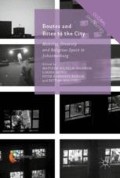Abstract
On almost every block of inner-city Johannesburg there is a poster advertising the wondrous capacities of a “Prophe t, ” one who is said to come from a distant region of Zimbabwe or further afield. The phenomenon of prophets selling their services has spread rapidly in the post-apartheid era; it has come alongside a resurgence of new evangelical and Pentecostal prophetic movements in the city, while adherents to older Zionist and Apostolic traditions persist in gathering on the mountainsides and beneath the bridges of the city. Some evangelical prophets hire soccer stadiums to prophesy during Easter, while others conduct ceremonies on the peripheries and mining wastelands of the city. How can we understand the resurgence of prophecy, and what can it tell us about the post-apartheid urban condition? In this chapter, we make a twofold argument. First, we propose that in its contemporary use, the “prophet ” is a divinely authorised reader and mediator of disjunctive spatial, temporal and moral orders . Second, we argue that prophets are compelled to provide empirical evidence that a provisional freedom and mobility in the city can be achieved—indeed that it can be made visible as an accomplished, if evanescent, fact. At the same time, however, by incarnating the word of God or channelling the Holy Spirit, they can also foreclose certain possibilities for their followers, while imposing forms of social, moral and gender ed control.
Access this chapter
Tax calculation will be finalised at checkout
Purchases are for personal use only
Notes
- 1.
In this move, we mirror Deleuze ’s (1990) analysis of the body in his reflections on Spinoza, in asking, not what a body is, but “what can a body do?”
- 2.
This cover is on display at Museum Africa in Newtown , Johannesburg.
- 3.
Pseudonyms in this chapter are acknowledged in-text. Otherwise names are used where interviewees requested or are in the public domain.
- 4.
References
Anderson, Allan. 1992. Bazalwane: African Pentecostals in South Africa. Pretoria: University of South Africa.
Anderson, A. 1999. The Lekganyanes and Prophecy in the Zion Christian church. Journal of Religion in Africa 29: 285–312.
Anderson, Dave, and Douglas Johnson. 1995. Revealing Prophets. In Revealing Prophets: Prophecy in Eastern African History, ed. Dave Anderson, and Douglas Johnson. London: James Currey Publishers.
Appadurai, Arjun. 2013. The Future as Cultural Fact: Essays on the Global Condition. London: Verso Books.
Cabrita, Joel. 2014. Text and Authority in the South African Nazaretha church. Cambridge: Cambridge University Press.
Chari, Sharad. 2013. Detritus in Durban: Polluted Environs and the Biopolitics of Refusal. In Imperial Debris: On Ruins and Ruination, ed. Laura Stoler, 131–161. London: Duke University Press.
Chidester, David. 1992. Religions of South Africa. London: Routledge.
———. 2012. Wild Religion: Tracking the Sacred in South Africa. Berkeley: University of California Press.
Comaroff, John L., and Jean Comaroff. 2009. Of Revelation and Revolution, The Dialectics of Modernity on a South African Frontier, vol 2. Chicago: University of Chicago Press.
Deleuze, Gilles. 1990. Expressionism in Philosophy: Spinoza. Michigan: University of Michigan Press.
Engelke, Matthew. 2005. The Early Days of Johane Masowe: Self-doubt, Uncertainty, and Religious Transformation. Comparative Studies in Society and History 47(04): 781–808.
———. 2007. A Problem of Presence: Beyond Scripture in an African church. Berkeley: University of California Press.
Gunner, Liz. 2004. The Man of Heaven and the Beautiful Ones of God: Isaiah Shembe and the Nazareth church. Scottsville: University of KwaZulu-Natal Press.
Guyer, Jane. 2007. Prophecy and the Near Future: Thoughts on Macroeconomic, Evangelical, and Punctuated Time. American Ethnologist 34(3): 409–421.
Kiernan, J.P. 1995. In The African Independent churches in Living Faiths in South Africa, ed. M. Prozesky, and J. de Gruchy. New York: St Martin’s Press.
Magaziner, Daniel. 2010. The Law and the Prophets: Black Consciousness in South Africa, 1968–1977. Johannesburg: Jacana Media.
Mukonyora, Isabel. 2007. Wandering a Gendered Wilderness: Suffering and Healing in an African Initiated church. New York: Peter Lang Publishing.
Olupona, Jacob. 2014. African Religions: A Very Short Introduction. Oxford: Oxford University Press.
Sundkler, Bengt. 1961. Bantu Prophets in South Africa. Oxford: Oxford University Press.
Thomas, Linda. 1994. African Indigenous churches as a Source of Socio-political Transformation in South Africa. Africa Today 41(1): 39–56.
Villa-Vicencio, Charles. 1995. Mission Christianity. In Living Faiths in South Africa, ed. Martin Prozesky, and John W. De Gruchy. Cape Town: David Philip.
Weber, Max. 1978. Economy and Society: An Outline of Interpretive Sociology. Los Angeles: University of California Press.
Werbner, Richard. 2011. Holy Hustlers, Schism, and Prophecy. Apostolic Reformation in Botswana. California: University of California Press.
Zulu, Melekias, and Matthew Wilhelm-Solomon. 2015. Tormented by Umnyama: An Urban Cosmology of Migration and Misfortune in Inner-City Johannesburg. In Healing and Change in the City of Gold, ed. Ingrid Palmary, Brandon Hamber, and Lorena Nuñez, 135–148. Heidelberg: Springer International Publishing.
Acknowledgments
Elements of this chapter appeared in the narrative piece ‘Prophets of the city’ by Matthew Wilhelm-Solomon in the e-book Writing Invisibility: Conversations on the Hidden city produced by the African Centre for Migration & Society with the Mail & Guardian, also part of the “Super-Diversity, South Africa” project of the Max Planck Institute for the Study of Religious and Ethnic Diversity.
Author information
Authors and Affiliations
Editor information
Editors and Affiliations
Copyright information
© 2016 The Author(s)
About this chapter
Cite this chapter
Wilhelm-Solomon, M., Zulu, M., Worby, E. (2016). Angels and Ancestors: Prophetic Diversity and Mobility in the City. In: Wilhelm-Solomon, M., Núñez, L., Kankonde Bukasa, P., Malcomess, B. (eds) Routes and Rites to the City. Global Diversities. Palgrave Macmillan, London. https://doi.org/10.1057/978-1-137-58890-6_10
Download citation
DOI: https://doi.org/10.1057/978-1-137-58890-6_10
Published:
Publisher Name: Palgrave Macmillan, London
Print ISBN: 978-1-137-58889-0
Online ISBN: 978-1-137-58890-6
eBook Packages: Social SciencesSocial Sciences (R0)

